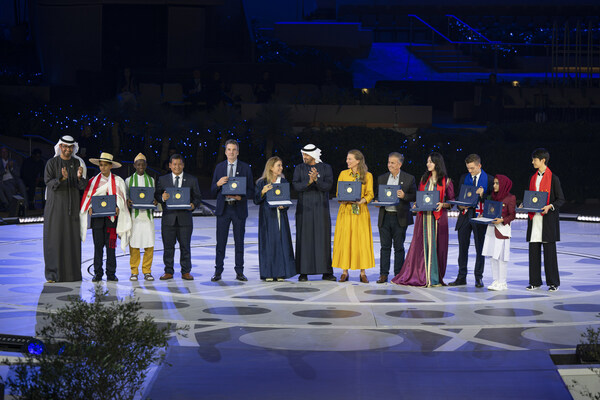Small and medium enterprises, nonprofit organisations and high schools are invited to submit entries before the 23 June 2024 deadline
ABU DHABI, UAE, Dec. 21, 2023 /PRNewswire/ — The Zayed Sustainability Prize, the UAE’s pioneering global sustainability and humanitarian award, has officially announced that the 2025 cycle is now open for submissions.
Submissions will be accepted until 23 June 2024 through the Prize’s online portal. Small to medium enterprises (SMEs), nonprofit organisations (NPOs) and high schools with sustainable solutions are invited to submit an entry for consideration in one of the six categories of Heath, Food, Energy, Water, Climate Action and Global High Schools.
Commenting on the launch of the 2025 submissions cycle, H.E. Dr. Sultan Ahmed Al Jaber, UAE Minister of Industry and Advanced Technology, Director General of the Zayed Sustainability Prize, and COP28 President, said: “Since 2008, the Zayed Sustainability Prize has honoured the legacy of Sheikh Zayed by fostering inclusive sustainable and humanitarian development around the world. In this decisive decade for climate change, these values are more important than ever. I am optimistic that the Prize will contribute to global climate action in line with the UAE Consensus, which will pave the way toward an effective response to the Global Stocktake decision.”
In response to the pressing climate crisis, and to further support the UAE’s efforts to accelerate practical solutions needed to drive climate action and uplift vulnerable communities around the world, the Prize has increased its funds from US $3.6 million to US $5.9 million. The Prize will reward US $1 million to each winner in the organisational categories of Health, Food, Energy, Water and Climate Action. Within the Global High Schools category, which is split into six world regions, each school can claim up to US $150,000 to start or further expand their project. The six world regions of the Global High Schools category are The Americas, Europe & Central Asia, Middle East & North Africa, Sub-Saharan Africa, South Asia, and East Asia & Pacific. The most recent Zayed Sustainability Prize winners were recognised at an Awards Ceremony held during COP28 UAE.
To encourage a broader range of organisations and high schools to participate, the Prize will be accepting submissions in multiple languages, including Arabic, Chinese, English, French, Russian, Spanish, and Portuguese. This will ensure that innovative solutions from diverse linguistic and cultural backgrounds can be recognised.
For the Health, Food, Energy, Water and Climate Action categories, organisations should prove that they are improving access to essential products or services in their targeted communities and are able to implement a long-term vision for better living and working conditions. For the Global High Schools category, projects should be led by students, and must demonstrate innovative approaches to address sustainability challenges.
The evaluation of each submission to the Prize consists of a rigorous, three-stage process. First, due diligence is conducted on all submissions to ensure that they meet the Prize’s evaluation criteria of Impact, Innovation, and Inspiration. This identifies the qualified entries and results in the selection of eligible candidates. Following this, evaluations are undertaken by a Selection Committee consisting of category-specific panels of independent international experts. From this shortlist of candidates, the finalists are chosen and then sent to the Prize Jury who unanimously elect the winners across all six categories.
Winners of the Zayed Sustainability Prize will be announced at an Awards Ceremony during the 2025 Abu Dhabi Sustainability Week (ADSW).
About the Zayed Sustainability Prize
The Zayed Sustainability Prize is a tribute to the legacy of the late founding father of the UAE, Sheikh Zayed bin Sultan Al Nahyan. The Prize aims to drive sustainable development and humanitarian action by recognising and rewarding organisations and high schools that are delivering innovative sustainable solutions across the categories of Health, Food, Energy, Water, Climate Action and Global High Schools. For over 15 years, through its 117 winners, the Prize has positively impacted the lives of 384 million worldwide.












